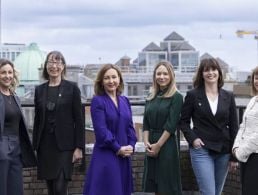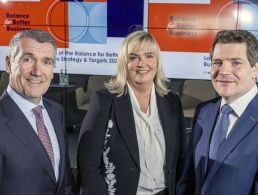Co-founder of IWish Gillian Keating discusses how we can address the information and confidence gaps facing women in STEM.
Gillian Keating is a corporate lawyer with Ronan Daly Jermyn solicitors. Her role in advising clients on legal solutions to business challenges led to her becoming the president of the Cork Chamber of Commerce, where she quickly became familiar with the skills shortages Ireland was experiencing in science and technology.
On this year’s World STEM Day (8 November), she talked to Siliconrepublic.com about her reasons for co-founding the IWish initiative, and how imperative it is that we invest in more woman leaders in science-related fields.
‘If, as a young girl, you have to travel across the road to the boys’ school to do physics or applied maths, we are implicitly telling girls it’s not for them’
– GILLIAN KEATING
Can you explain the motivations behind founding IWish?
It became abundantly clear very quickly that the skills gap was partly due to the lack of female uptake for technology and engineering roles.
We were particularly struck by the fact that between 2004 and 2014, the percentage of females taking up courses in higher education in technology, engineering and maths had hardly moved at all. Technology stayed at 17pc, engineering shifted just one percentage point from 23pc to 24pc, and maths was in decline, moving from 35pc in 2004 to 22pc in 2014.
I and two other like-minded women then joined forces and hatched a plan to deliver real change. At that time, it was really more about the economic case – we wanted to ensure Ireland would be best-placed to continue to compete globally for FDI and to ensure Irish companies were well-resourced to grow their business out of Ireland. Without the strongest and most diverse talent pool, this would simply not happen.
Gillian Keating, co-founder of IWish. Image: Shane O’Neill, SON Photographic
Do we need to work harder to get more girls and women into leadership positions?
Absolutely, but I would reposition the goal. As I said, when we started IWish it was, for us, all about the economic case. Now, as our understanding of the impediments to female engagement across the STEM arena grows, we have shifted our focus.
We are now very focused on how we as a society need to fully enable young women to participate in the economy of the future. We are currently limiting them in a number of ways. Many subjects such as physics and applied maths or engineering are not available at all in some girls-only schools, or are only available if the girls are willing to travel across to the local boys’ school.
This is not good for the future of technology and the lack of female engagement presents many risks for society as a whole, from codifying bias in AI to stagnating innovation in sectors of society that apply to women more than men. This has been very well publicised recently in the area of female heath in particular.
We must adopt a two-pronged approach, focusing more on understanding how we consciously and unconsciously limit young women and how best to remove those limitations as a matter of urgency.
At the same time, we need to listen to what the next generation of women tell us is important to them in choosing subjects, higher education courses and careers, and showcase the opportunities in STEM. In the end, we will see more young women exploring opportunities in STEM, and only then will we fully enable the technologies of the future and these young women will start to shape a better world.
Once we knock the hurdles that we as a society have helped create, I am certain more young women will lead. Women don’t fear leadership, we have just been holding them back.
What are the biggest challenges in achieving that?
At IWish, we focus on addressing two key challenges: the information gap and the confidence gap.
We need to do a better job at educating parents, teachers and young women on the opportunities in STEM. We survey thousands of young girls every year at IWish on their attitudes to STEM and what influences their subject and career choices. The girls tell us that they want a career where they can improve people’s lives, but they don’t know how STEM can do that. We need to show them.
The girls have also told us that three of the top reasons they chose a particular subject for the Leaving Cert were directly influenced by their teacher. At IWish, we set up a ‘Teach It’ zone to support teachers in understanding the careers available through STEM and the companies operating in the arena in their area.
The confidence gap is a more difficult issue to address, however, as that is a factor of the society in which young girls are growing up in, and is a result of many interactions a girl has over her lifetime. If, as a young girl, you have to travel across the road to the boys’ school to do physics or applied maths, we are implicitly telling girls it’s not for them.
If young girls’ career guidance opportunities are limited to traditional choices and they only meet female nurses, doctors, teachers and nutritionists, and don’t get to meet female engineers from Arup or data analysts from Dell Technologies and hear how they are innovating and breaking the mould of what was impossible, creating new frontiers and improving people’s lives in areas from healthcare to smart city living, we will never enable them. In our IWish 2019 survey, 75pc of girls said that role models are very important in STEM.
Someone said to me once that she took confidence from people who placed their confidence in her. We say we are surprised by and don’t understand the reasons for the confidence gap and yet, from a young age, we give young girls mixed messages about what they are ‘suited to’ or ‘capable of’, and then we expect them to be ambitious and brave at just 17, when they leave school.
Young girls leave IWish with a newfound confidence in what they can achieve and a tangible excitement about the opportunities ahead of them.
Do you have any specific words of advice for women of any age who want to pursue a career in STEM?
I would borrow the words of Prof Klaus Schwab, founder and executive chair of the World Economic Forum. He said: “The reality is that the future offers humankind many opportunities for healthier, greener, more fulfilled and peaceful lives. It is incumbent on all of us – working together – to improve the state of the world.”
In my view, technology fully enabled by the most diverse group of people will make this possibility a reality – how could you not want to play your part?




